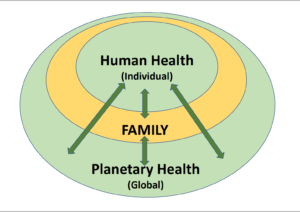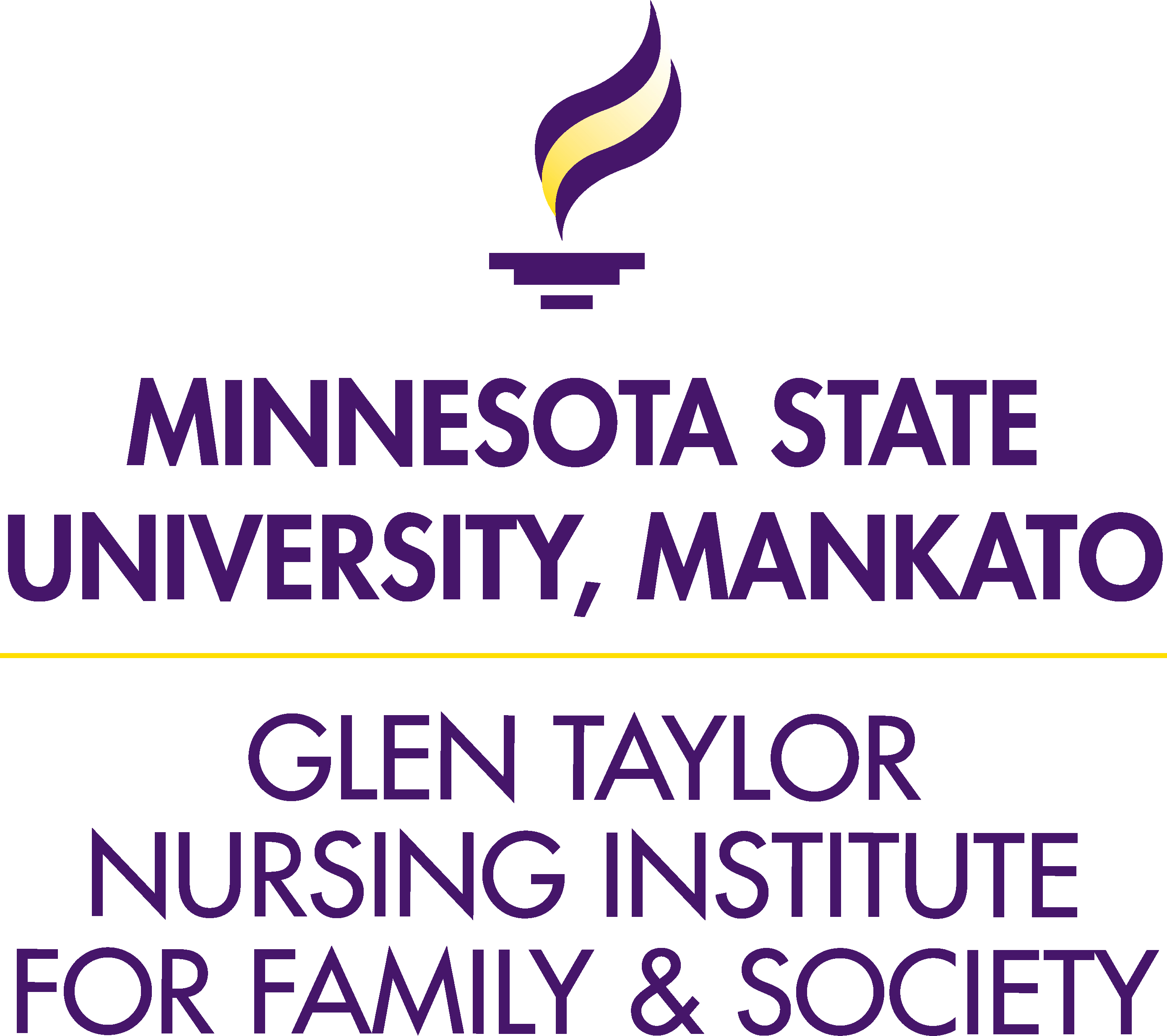Since 2015 when the Rockefeller Foundation-Lancet Commission introduced planetary health (Whitmee et al., 2015), the interconnection between the environment and human health has become increasingly evident. Planetary health is grounded in the realization that human health is dependent on thriving, well-balanced ecosystems (Halonen et al., 2021). A thriving ecosystem is well-recognized to include climate change, air pollution, use of land and water, food safety and security, and biodiversity. These elements affect human health and wellbeing. However, the link between human health and planetary health is complex in that multi-directional interactions among family, community, and individuals are intricately interlaced.
 IFNA’s Position Statement on Planetary Health and Family Health eloquently addresses the importance of family health within the scheme of planetary health. Yet the importance of family is not often discussed beyond IFNA and family researchers. “Human” health seems to be the common terminology used in planetary health discussion and can be interpreted as health for individuals or populations. It seems that family is an unspoken layer that either mediates or moderates the connection between human health and the planet. Thus, thinking in the mode of the ecological systems model (Bronfenbrenner, 1979), we propose this diagram and ask you to consider where is family in the interrelationship between human health and planetary health? And how can we as family researchers illuminate family, family nursing, and family health within planetary health?
IFNA’s Position Statement on Planetary Health and Family Health eloquently addresses the importance of family health within the scheme of planetary health. Yet the importance of family is not often discussed beyond IFNA and family researchers. “Human” health seems to be the common terminology used in planetary health discussion and can be interpreted as health for individuals or populations. It seems that family is an unspoken layer that either mediates or moderates the connection between human health and the planet. Thus, thinking in the mode of the ecological systems model (Bronfenbrenner, 1979), we propose this diagram and ask you to consider where is family in the interrelationship between human health and planetary health? And how can we as family researchers illuminate family, family nursing, and family health within planetary health?
Research priorities for human and planetary health in the context of the 2030 agenda for sustainable development have been addressed by Ebi et al. (2020). This transdisciplinary, global team identified knowledge gaps in research important and necessary to understanding the health risks of global environmental change.
The research agenda identifies four priority research themes to sustainably protect and promote planetary health and human well-being (EBI, et al. 2020, p15):
- Risk identification and management (including related to water, hygiene, sanitation, and waste management; food production and consumption; oceans; and extreme weather events and climate change)
- Strengthening climate-resilient health systems
- Monitoring, surveillance, and evaluation
- Risk communication
This research agenda is broad and further recommends attention to international collaborations with sharing information and building capacity, understanding patterns of planetary health to improve population health not only short-term but long-term, including diverse representation, disseminating results broadly beyond academia, and using results to develop policy. In reviewing this research agenda, it is important to consider how to integrate family nursing perspectives looking both upstream at the causes affecting planetary health and downstream at the outcomes.
Family nurses are called upon to examine upstream prevention efforts to mitigate climate sequelae downstream (Leffers & Butterfield, 2018) as a means to prioritize needs related to adaptation and resilience within families. Family nurses are in a unique position to connect with individuals and families and learn about their behaviors through partnerships established within communities affected by planetary health factors. A variety of research methods can be initiated to expand a family perspective including epidemiology, big data analysis, action research, and phenomenology.
Family nursing research in planetary health, exploring both upstream and downstream factors, will contribute to the growing evidence upon which health and social policy are based. For example, research on family planetary health literacy may include exploring how families incorporate planetary health into family work and educate family members. Considering downstream factors, research will be needed to document the tsunami of trauma that might follow various climate events including research that illustrates the impact of climate catastrophe and climate injustice on families, documents ways families adapt and the challenges they encounter that affect adaptation, and addresses life events at home, work, or in the community day-to-day or through disasters. Finally, families, integral to caregiving in chronic illness, will be able to articulate the lived experience of how climates change or how secondary effects of climate disaster impact management of physical health and illness.
Research that can be explained and translated into action requires a framework to provide structure and enable interpretation. Above we proposed a diagram to facilitate discussion of where family fits within planetary and human health. In addition, we suggest you review a newly published ecological framework for human wellbeing that may be useful when formulating research questions about family and planetary health. This framework was developed by health and wellbeing leaders including researchers, academics, policymakers, and leaders of grassroots and private sector organizations. Importantly, the framework includes an overarching level of “Well-Being of Environment and Planet” (Acharya, 2020). This work explicitly acknowledges the relationship between humans, their health and wellbeing, and their environment and the Earth. Other levels in the framework focus on the individual, their community, and the civic systems that provide governance and policies. Again, it is up to us, as family researchers, to illuminate the level of family in this framework.
Scholars focusing on the concept of planetary health may examine state or national policies, family beliefs, and individual behaviors to determine whether meaningful contributions are being made toward addressing planetary health. Informing and evaluating the effectiveness of local, state, and national policies would provide visibility into how these policies expand opportunities or create constraints to approaches that address planetary health and family.
Overall, understanding the environment and its impact on health has long been central to nursing care, research, and theory. Building on family nursing’s history of addressing family strengths, family nurse researchers are in a prime position to investigate how families can strengthen their resilience to weather the impact of planetary health issues such as climate change and catastrophic climate events around the world. Family nursing researchers can be stewards of family and planetary health by exploring families’ interactions with the environment and how enhancing family strengths can support planetary health. By working with and learning from families, we can create partnerships to nurture the planet for future generations of families.
Next month, we will focus on assessing families through a planetary health lens in family nursing practice. This blog series is being hosted by the International Family Nursing Association to support implementation of the IFNA Position Statement on Planetary Health and Family Health.
How to cite the IFNA Position Statement on Planetary Health and Family Health (APA 7th edition format):
International Family Nursing Association (IFNA). (2020). IFNA Position Statement on Planetary Health and Family Health. https://internationalfamilynursing.org/2020/04/18/ifna-position-statement-on-planetary-health-and-family-health/
References
Acharya, K., & Plough, A. (2020) Introduction: The Imperative for Well-being in an Inequitable World. In A.L. Plough, Editor, Well-Being: Expanding the Definition of Progress (pp. xi-xviii). Oxford University Press.
Bronfenbrenner, U. (1979). The ecology of human development: Experiments by nature and design. Cambridge, MA: Harvard University Press.
Ebi, K.L., Harris, F., Sioen, G.B., Wannous, C., Anyamba, A., Bi, P., Boeckmann, M., Bowen, K., Cisse, G., Dasgupta, P., Dida, G.O., Gasparatos, A., Gatzweiler, F., Javadi, F., Kanbara, S., Kone, B., Maycock,B., Morse, A., Murakami, T., …Capon, A. (2020). Transdisciplinary research priorities for human and planetary health in the context of the 2030 agenda for sustainable development. International Journal of Environmental Research and Public Health, 17.
Halonen, J.I., Erhola, M., Furman, E., Haahtela, T., Jousilahti, P., Barouki, R., Bergman, A., Billo, N.E., Fuller, R., Haines, A., Kogevinas, M., Kollassa-Gehring, M., Krauze, K., Lanki, T., Vicente, J.L., Messerli, P., Nieuwenhuijsen, M., Paloniemi, R., Peters, A., …Anto, J.M. (2021). A call for urgent action to safeguard our planet and our health in line with the Helsinki declaration. Environmental Research, 193.
The Lancet Planetary Health. (2019). The bigger picture of planetary health. The Lancet, 3. www.thelancet.com/planetary-health
Leffers, J., & Butterfield, P. (2018). Nurses play essential roles in reducing health problems due to climate change. Nursing outlook, 66(2), 210-213.
Whitemee, S., Haines, A., Beyrer, C., Boltz, F. Capon, A.G., Ferreira de Souza Dias, B., Ezeh, A., Frumkin, H., Gong, P., Head, P., Horton, R., Mace, G.M., Marten, R., Myers, S.S., Nishtar, S., Osofsky, S.A., Pattanayak, S.K., Pongsiri, M.J., Romanelli, C., ….Derek Yach (2015). Safeguarding human health in the Anthropocene epoch: Report of The Rockefeller Foundation–Lancet Commission on planetary health.
We would like to acknowledge Dr. Paula Nersesian and her support and guidance in helping this blog post come to life.
Cindy Danford, PhD, CRNP, PPCNP-BC, CPNP-PC, is a nurse scientist at Cleveland Clinic Foundation and an assistant professor in the School of Nursing at the University of Pittsburgh. Her scholarship focuses on families with young children in an effort to instill healthy lifestyle habits to minimize obesity and cardiovascular risk. She co-chairs the IFNA Research Committee and leads the Pediatric Research Cluster as part of the IFNA research collaboration subcommittee.
Kim Mooney-Doyle, PhD, RN, CPNP-AC, is an assistant professor in the School of Nursing at the University of Maryland. Her research focuses on promoting family well-being in the context of pediatric serious illness and palliative and end-of-life care. She is co-chair of the IFNA Research Committee and leads the Family Ethics Sub-Committee of the Research Committee. You can follow her on Twitter @kimmooneydoyle.
